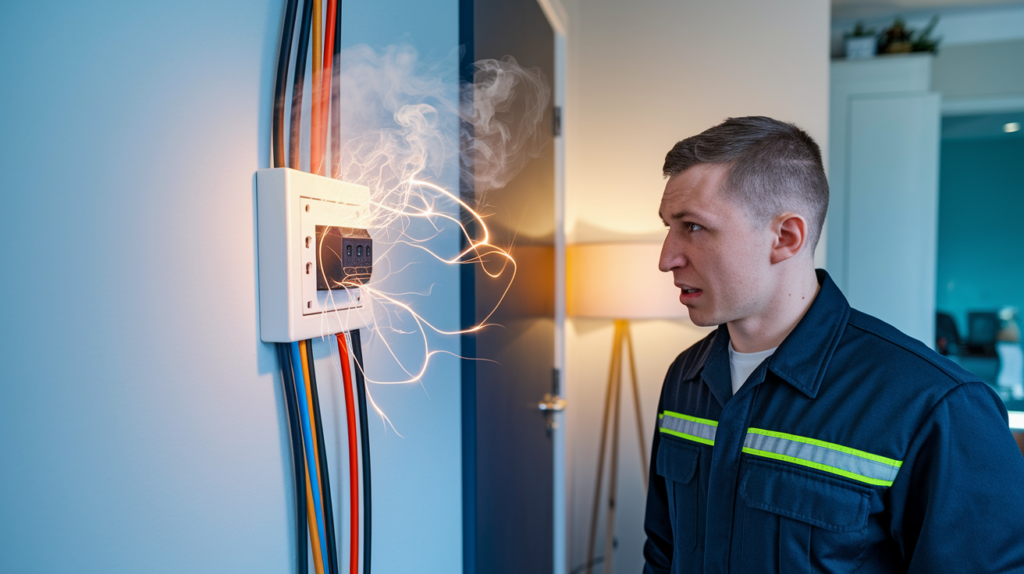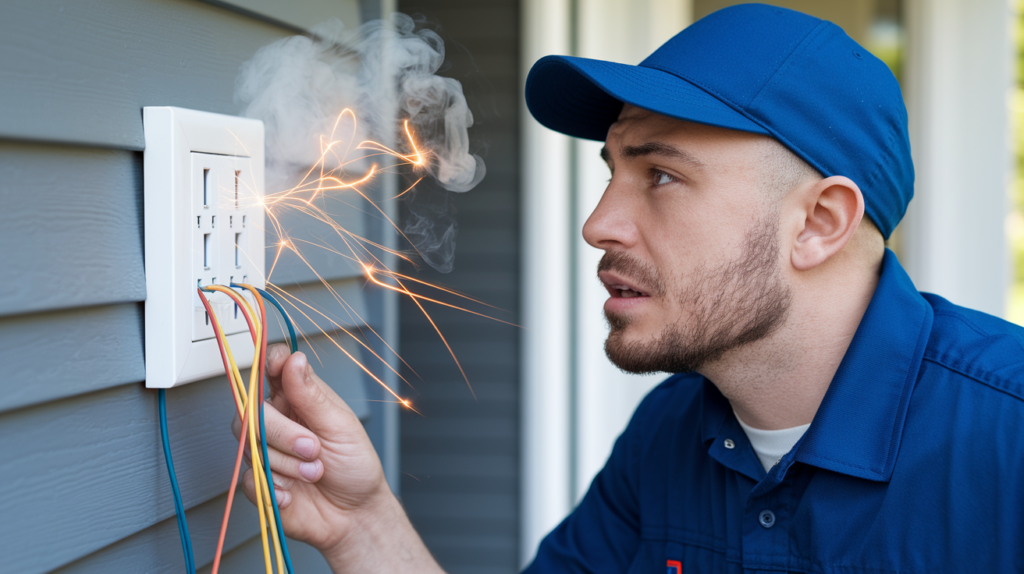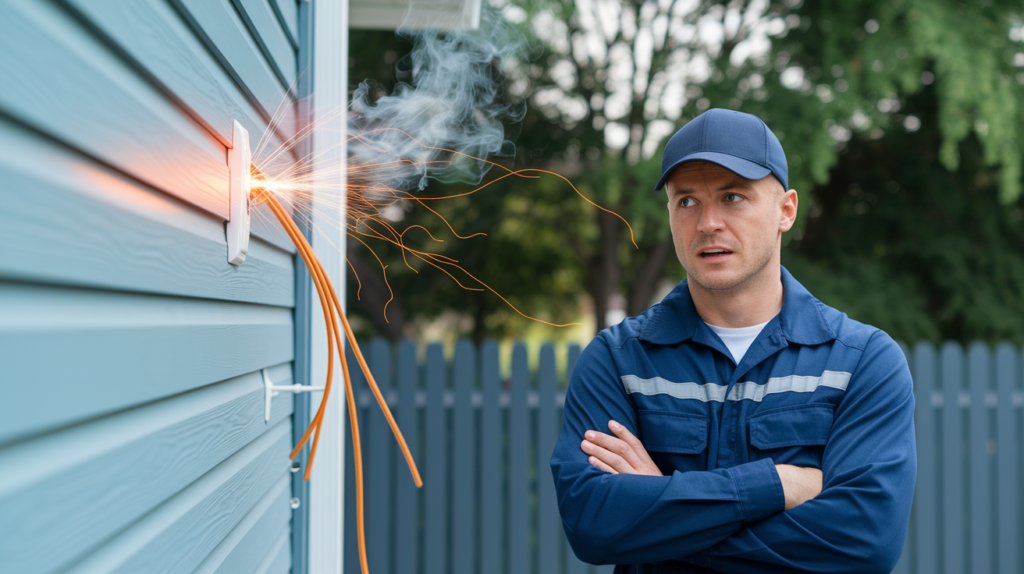Heat-related electrical fires are a significant safety hazard in many homes, particularly during hot summer months when electrical appliances are in heavy use. According to the National Fire Protection Association (NFPA), electrical failures or malfunctions are a leading cause of home fires in the United States. Fortunately, many of these fires are preventable with the right precautions and maintenance. In this blog, we will explore effective strategies to prevent heat-related electrical fires and ensure your home’s safety.

Understanding Heat-Related Electrical Fires
Electrical fires occur when electrical wiring, devices, or appliances overheat, leading to sparks or flames. Overheating can be triggered by several factors, including:
- Overloaded Circuits: When too many appliances are connected to a single circuit, it can overload the electrical system, causing wires to overheat.
- Faulty Wiring: Damaged or outdated wiring can lead to short circuits or electrical arcing, which generates excessive heat.
- Improper Use of Electrical Devices: Using appliances beyond their capacity or inappropriately can lead to overheating.
- Environmental Heat: High ambient temperatures can exacerbate electrical issues, making components more susceptible to overheating and failure.

Common Signs of Electrical Overheating
To prevent electrical fires, it is crucial to recognize the early warning signs of overheating, which include:
- Warm Outlets or Switches: If electrical outlets or switches feel warm or hot to the touch, it may indicate an overloaded circuit or faulty wiring.
- Flickering Lights: Lights that flicker or dim frequently suggest issues with wiring or circuit overloads.
- Burning Smell: A burning or smoky odor near electrical outlets, appliances, or wiring is a serious warning sign.
- Sparks or Arcing: If you observe sparks when plugging in or unplugging devices, it is a clear indicator of an electrical problem.
- Frequent Tripped Circuit Breakers: Circuit breakers that frequently trip are usually a sign of overloaded circuits or faulty wiring.

Tips to Prevent Heat-Related Electrical Fires
1. Inspect and Maintain Electrical Wiring
Old or damaged wiring is a major cause of electrical fires. To minimize the risk:
- Schedule Regular Inspections: Hire a licensed electrician to inspect your home’s wiring at least once every 5-10 years, especially in older homes.
- Replace Outdated Wiring: Aluminum wiring, common in homes built before the 1970s, is more prone to overheating. Consider upgrading to copper wiring.
- Repair Damaged Cords and Wires: Never use appliances with frayed cords or damaged plugs. Replace them immediately.
2. Avoid Overloading Circuits
Overloading circuits is a common cause of electrical fires. Follow these guidelines to avoid it:
- Distribute Electrical Loads: Spread out high-wattage appliances across multiple circuits instead of plugging them all into one outlet.
- Use Surge Protectors: Utilize surge protectors with built-in overload protection for multiple devices.
- Be Mindful of Extension Cords: Avoid using extension cords as permanent wiring. If necessary, use heavy-duty extension cords designed for higher power loads.
3. Use Electrical Appliances Safely
Improper use of appliances can easily lead to overheating. To use them safely:
- Follow Manufacturer Instructions: Always use appliances according to the manufacturer’s guidelines and recommended wattage.
- Turn Off Unused Devices: Unplug appliances and devices when not in use to prevent overheating.
- Maintain Ventilation: Ensure proper ventilation for heat-generating appliances like refrigerators, ovens, and heaters to prevent them from overheating.
4. Install Proper Safety Devices
Safety devices are critical in detecting and preventing electrical fires. Consider the following installations:
- Smoke Alarms: Install smoke alarms in every room, and test them monthly to ensure they are functioning correctly.
- Arc Fault Circuit Interrupters (AFCIs): These devices detect dangerous arcing conditions and automatically shut off the power to prevent fires.
- Ground Fault Circuit Interrupters (GFCIs): GFCIs prevent electric shocks and fires by shutting off power when an imbalance is detected.
- Smart Home Monitoring Systems: Advanced systems can monitor electrical usage and alert you to potential issues like overheating or overloading.
5. Keep Electrical Components Cool
Heat is a significant factor in electrical fires. To keep electrical components cool:
- Ensure Proper Airflow: Do not block air vents on electronic devices, as this can cause them to overheat.
- Position Appliances Safely: Keep heat-producing appliances away from flammable materials such as curtains and papers.
- Avoid Sun Exposure: Do not place electrical devices in direct sunlight, as it can cause overheating.
6. Be Cautious with Temporary Heating and Cooling Devices
Portable heaters and air conditioners can be significant fire hazards if not used properly. Follow these tips:
- Use on Stable Surfaces: Place portable heaters on stable, non-flammable surfaces away from combustible materials.
- Avoid Overloading Outlets: Plug heaters and air conditioners directly into wall outlets, not into power strips or extension cords.
- Turn Off When Unattended: Always turn off heating or cooling devices when leaving the room or going to sleep.
7. Educate Your Household
Prevention also involves awareness and education:
- Teach Safety Practices: Educate family members about safe electrical practices, including the dangers of overloading circuits and using appliances responsibly.
- Create an Emergency Plan: Prepare and practice an emergency escape plan in case of an electrical fire.
- Know How to Use a Fire Extinguisher: Keep a Class C fire extinguisher handy for electrical fires and make sure everyone knows how to use it.
What to Do in Case of an Electrical Fire
Despite preventive measures, electrical fires can still occur. In case of an emergency:
- Shut Off Power: If safe to do so, switch off the power at the circuit breaker to cut off the electricity source.
- Use a Class C Fire Extinguisher: Use an appropriate fire extinguisher for electrical fires. Never use water, as it conducts electricity.
- Evacuate Immediately: If the fire cannot be controlled, evacuate the premises immediately and call 911.
Conclusion
Preventing heat-related electrical fires requires vigilance, proper maintenance, and safe usage of electrical devices. By regularly inspecting wiring, avoiding overloaded circuits, using safety devices, and educating household members, you can significantly reduce the risk of electrical fires in your home.
Remember, safety begins with awareness and proactive measures. Implementing these practices will not only protect your home but also ensure the safety of your loved ones.
Stay safe, stay vigilant, and protect your home from the dangers of heat-related electrical fires.
